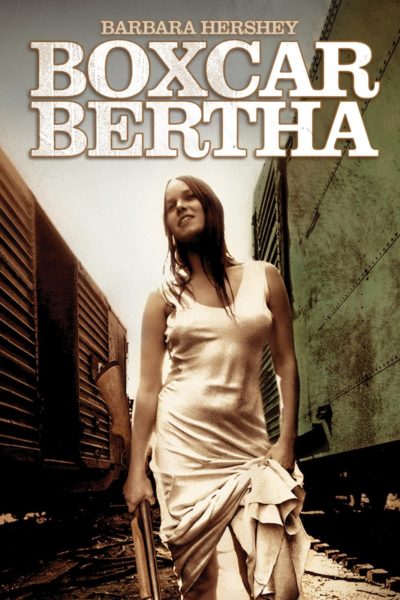★★★
“Tracks of my tears.”
 After the success of Bloody Mama, producer Roger Corman wanted to follow up with another film depicting lawlessness in the Depression. He found his source material in Sister of the Road, supposedly the autobiography of a thirties drifter called Boxcar Bertha. No such one person actually existed: it was assembled by the author, Dr. Ben L. Reitman, from multiple characters he met while helping women in trouble in Chicago (a fictionalized version of the doctor may appear in the movie). Corman hired the then almost unknown Martin Scorsese, who was directing his first commercial film; its predecessor, Who’s That Knocking at My Door, grossed only $16,085. Scorsese was given a schedule of 24 days and a budget of $600,000.
After the success of Bloody Mama, producer Roger Corman wanted to follow up with another film depicting lawlessness in the Depression. He found his source material in Sister of the Road, supposedly the autobiography of a thirties drifter called Boxcar Bertha. No such one person actually existed: it was assembled by the author, Dr. Ben L. Reitman, from multiple characters he met while helping women in trouble in Chicago (a fictionalized version of the doctor may appear in the movie). Corman hired the then almost unknown Martin Scorsese, who was directing his first commercial film; its predecessor, Who’s That Knocking at My Door, grossed only $16,085. Scorsese was given a schedule of 24 days and a budget of $600,000.
It begins with Bertha Thompson (Hershey) hitting the road after her father is killed when his crop-dusting plane crashes. Accompanied by her father’s mechanic Von Morton (Casey), she falls in with union leader Big Bill Shelly (Carradine), who is rousing workers against railroad owners such as H. Buckram Sartoris (played by Carradine’s father John), as well as card sharp Rake Brown (Primus). Bertha becomes an outlaw after shooting a man who catches Rake cheating, and Bill’s union activities end up leaving him in prison. Bertha helps break him out, and the quartet take up a life of crime, robbing the rich industry barons, who are none too pleased by the gang’s activities. Inevitably – especially if you’re familiar with Scorsese’s better-known work – it ends in blood.
In that, as well as the era and the story of young love gone violently wrong, it feels not dissimilar to Bonnie and Clyde, made five years earlier. But Bertha is a considerably more independent character, who has to fend for herself on more than one occasion, after her three colleagues are arrested and sent to prison. Though violence is never her first choice, it always remains an option. That’s true right through the brutal finale where Bill is nailed to the side of a train, only for Von to show up with a shotgun. It is a scene that could have come from Sam Peckinpah’s The Wild Bunch (three years earlier), yet also feels like pure Scorsese.
The socialist and pro-union political leanings, turning Bertha and her crew into Depression-era Robin Hoods, is also interesting. Scorsese would not be a stranger to a sympathetic portrayal of the criminal classes, from Mean Streets through Casino to The Irishman. Yet it also remains a Corman film, clocking in at a brisk 88 minutes, in sharp contrast to Scorsese’s subsequent fondness for sprawling epics. Hershey, then at the beginning of her lengthy career, would provide the necessary nudity. Though it’s notable that even when working as a prostitute, she might allow the use of her body, but her heart always remained Bill’s. Despite the exploitation elements, it all feels a bit worthy, and it’s no wonder Scorsese would quickly go his own way, his interests not in line with Corman. For example, the crucifixion of Bill, with Bertha in the role of Mary Magdalene is a tad too on the nose. The heroine is an interesting enough creature on her own terms, not to need this kind of unsubtle embellishment.
Dir: Martin Scorsese
Star: Barbara Hershey, David Carradine, Barry Primus, Bernie Casey




